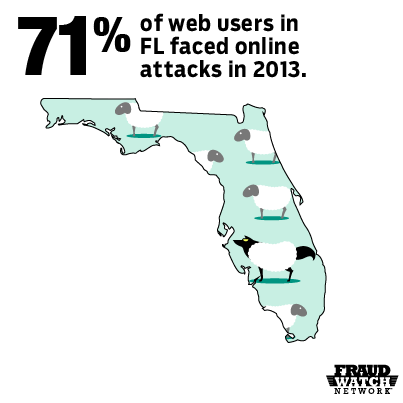AARP Hearing Center

A new AARP study identifies an online victim profile based on 15 key behaviors and life experiences that increase a person’s vulnerability to online fraud. The report, “Caught in the Scammer’s Net,” a survey of 926 Florida adults finds that 2.7 million Internet users may be at increased risk of being victimized based on this new profile.
The study, which compared victims and non-victims, finds that it is the combination of online behaviors and life experiences that put a person at the greatest risk of being scammed. Among the 15 questions probed in the survey were whether participants had engaged in certain behaviors, including opening an email from an unknown source, clicking on a pop-up or signing up for a free trial offer in the past week. In addition, the survey asked whether people were experiencing life stressors, including “sometimes or often” feeling personally isolated, and whether they lost a job or “experienced a negative change in financial status” in the past two years.
“AARP’s new study shows it’s not enough for you to follow a simple list of online dos and don’ts to protect yourself from being scammed,” said AARP’s Florida state director, Jeff Johnson. “It’s also important to realize that big changes in your life that cause stress can undermine your ability to fend off a con artist’s attack.”
When comparing the differences between victims of online fraud with non-victims, victims were found to be involved with an average of seven of the key risk factors. According to the survey, 24 percent – or as many as 2.7 million Florida adults age 18 or older who used the Internet – have also demonstrated at least seven key risk factors and therefore may be at high risk of victimization.
AARP found that victims took part in risky behaviors far more often than non-victims in the national version of its survey:
- Clicked on pop-up ads – 26 percent of victims surveyed nationally, compared to only 10 percent of non-victims, said they had clicked on a pop-up ad in the previous seven days.
- Opened an email from an unknown person – 26 percent of victims surveyed nationally, compared to only 17 percent of non-victims, said they had opened an email from an unknown person in the last seven days;
- Signed up for free trial offers – 18 percent of victims, compared to only 8 percent of non-victims, said in the national survey that they had signed up for a free trial offer in the last seven days.
In its national survey, AARP also found that victims were more likely than non-victims to report feeling isolated:
- 66 percent of victims in the national survey, compared to only 42 percent of non-victims, said they “often” or “sometimes” feel isolated.
- 23 percent of victims, compared to only 10 percent of non-victims, taking part in the national survey said they had experienced loss of a job.
- 44 percent of victims, compared to only 23 percent of non-victims, said in the national survey that they had suffered a “negative change in financial status” in the past two years.
Johnson noted that according to one research report on identify theft, more than $20 billion was stolen from 13 million victims in 2012. The Federal Trade Commission has reported that online scams doubled from just over 20 percent of all fraud in 2007 to nearly 40 percent in 2011.
The study was led by the AARP Fraud Watch Network -- a national campaign to protect Floridians and all Americans from identity theft and fraud.
“A vital part of avoiding scams is knowing what to watch for,” said Johnson. “That’s why AARP’s Fraud Watch Network connects people to experts, law enforcement and people like them who can help them spot and avoid scams. When Floridians have information about what makes them vulnerable, they can outsmart scammers before their hard-earned money disappears.”
Available free of charge to AARP members and non-members alike, and people of any age, the Fraud Watch Network provides:
- Watchdog Alert emails that deliver breaking scam information,
- Prevention tips based on the latest information from experts,
- An interactive map with the latest law enforcement warnings from each state,
- A phone number people can call to talk to volunteers trained to help fraud victims, and
- Access to a network of people who are sharing their experiences with scams so they can help others protect themselves.
For a copy of the national survey, click here: http://www.aarp.org/onlinefraud
The GFK Group conducted the Internet-based survey for AARP last November and December. The margin of error was 3.1 percent.
AARP is a nonprofit, nonpartisan organization, with a membership of nearly 38 million, that helps people turn their goals and dreams into real possibilities, strengthens communities and fights for the issues that matter most to families such as healthcare, employment and income security, retirement planning, affordable utilities and protection from financial abuse. We advocate for individuals in the marketplace by selecting products and services of high quality and value to carry the AARP name as well as help our members obtain discounts on a wide range of products, travel, and services. A trusted source for lifestyle tips, news and educational information, AARP produces AARP The Magazine, the world's largest circulation magazine; AARP Bulletin; http://www.aarp.org/; AARP TV & Radio; AARP Books; and AARP en Español, a Spanish-language website addressing the interests and needs of Hispanics. AARP does not endorse candidates for public office or make contributions to political campaigns or candidates. The AARP Foundation is an affiliated charity that provides security, protection, and empowerment to older persons in need with support from thousands of volunteers, donors, and sponsors. AARP has staffed offices in all 50 states, the District of Columbia, Puerto Rico, and the U.S. Virgin Islands. Learn more at http://www.aarp.org/.































































